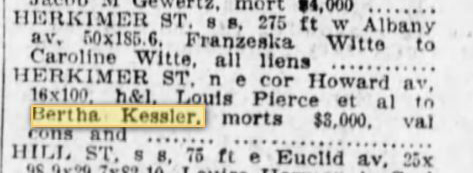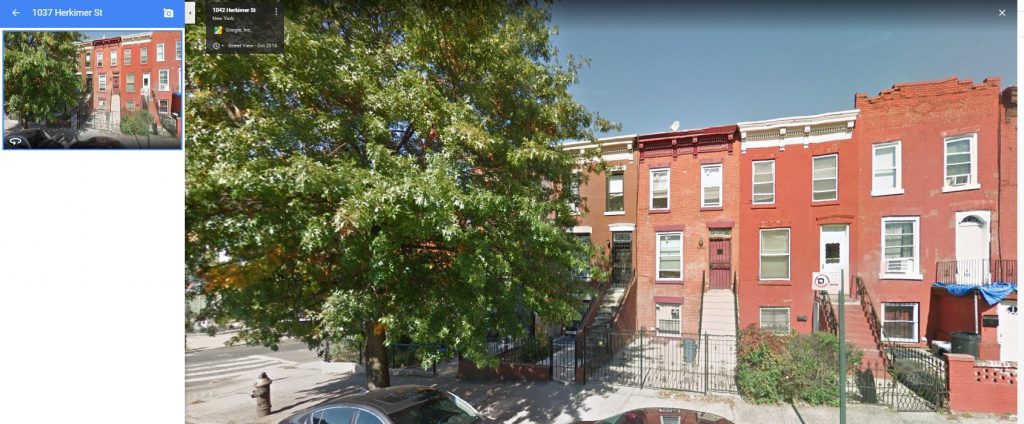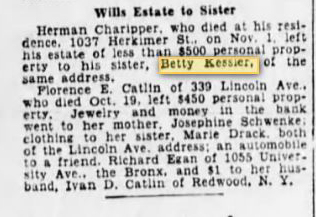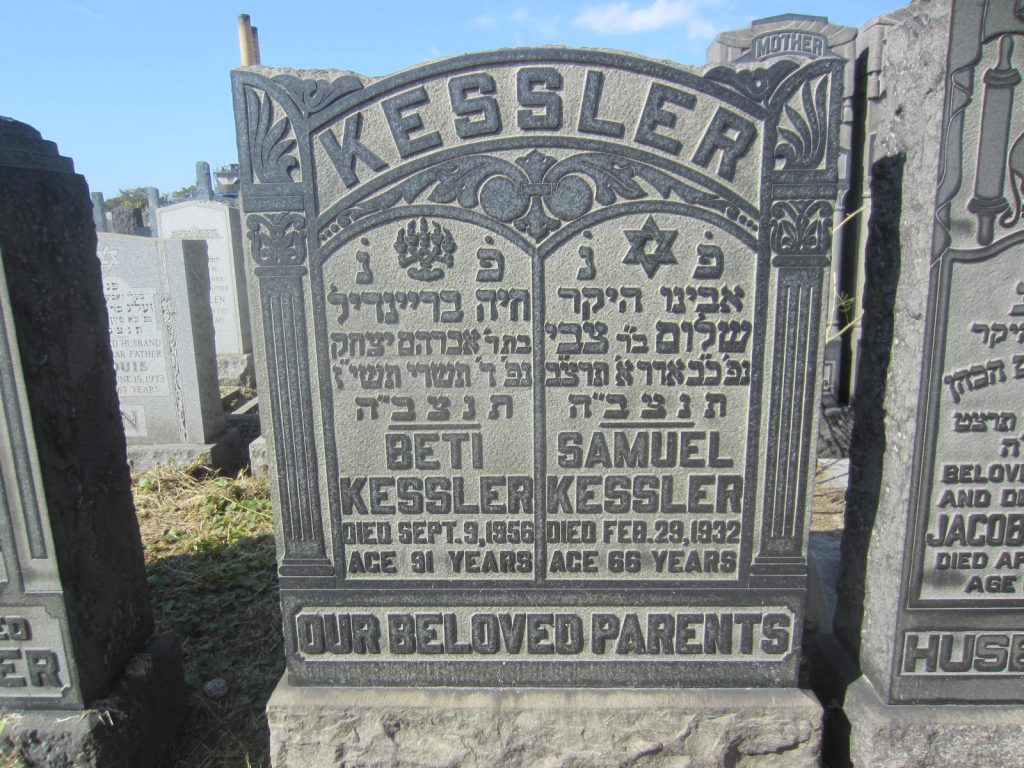Bertha was born about 1886 in Brody. At that time, Brody was in Galicia in the Austrian Empire. Her parents were Abramham Yikzak Charipper and Sarah Zarke. Her Hebrew name was Chaya Breindal and in Brooklyn, NY, she was also known as Beti.
Bertha had at least 9 siblings and 2 older step-siblings. We know that her brother, Herman, eventually settled in the US, as well as one step-nephew, Adolph, son of her step-brother, Bernhardt.
She married Samuel Kessler in 1886 and gave birth to her first child, a son, Lippman in 1887. Did she have other children before immigrating? We don’t know, but her next child that we know of was born in New York in 1896.
She told her grandchildren, that she won a lottery which allowed her to immigrate to the United States. She arrived around 1894. Did she travel with her husband and son, or did she travel alone, or just with Lippman? We have yet to find that out, too.
When her son Abe was born in 1896, they were living at 167 Allen Street on the Lower East Side of Manhattan. From there they move to 22 Hicks Street in Brooklyn, NY.
Over the years, she gave birth to 7 children with only 3 (Abe, Edith, and Morris) surviving to adulthood.
- Lippman was born in July 1887 in Galicia, Austria. He died tragically on May 24, 1908, at age 20, in New York from a murder/suicide.
- Abraham Ernest was born in February 1896 In New York. He died on Feb. 11, 1991, at age 95 in California.
- Edith Kessler Kasel was born on March 15, 1897, in New York. She died in 1991 at age 94.
- Benjamin (twin) was born on February 18, 1899, in New York. He died on September 17, 1900, at 1 year and 7 months old
- Israel Mordche (twin) was born on February 18, 1899, in Brooklyn, New York. Israel died on June 25, 1899, at 4 months old.
- Frederick was born on May 11, 1902, in Brooklyn, New York. He died on May 1, 1904, at almost 2 years old.
- Morris Bernhart was born on February 18, 1905, in New York. He died on January 24, 2003, in New York. He was 98 years old.
In 1907, she and her husband purchased a home at 1037 Herkimer Street in Brooklyn, NY. The house was put in her name and had a mortgage of $3000. It was a cold water flat which means it had no running hot water. Cold water flats usually did not have built-in showers and to bathe you had to heat pots of water on the stove and add the headed water to the bathtub. They also did not have central heating. To keep warm, people used kerosene or electric space heaters, hot water bottles, and later on, electric blankets.


She became known as “the Mayor” of the block, according to her granddaughter, Florence, and was described as being as wide as she was tall. Although they were able to buy their own home, according to their son, Abe, they were very poor.
Bertha had more than her share of tragedy and heartbreak. Besides the babies she lost, in 1908, her oldest son, Lippman, died from a self-inflicted gunshot after killing his girlfriend. Then in November of 1917, her son Abe married his girlfriend, Anna Feldman, who was 7 months pregnant. Did Bertha influence the young couple to put the baby up for adoption rather than bring more shame to the family? We will never know, but Abe and Anna did give their first daughter up for adoption. In 1918, babies born out-of-wedlock were not accepted in “nice” society, and the women who gave birth to them were scorned.
During the Great Depression, she did everything she could to make ends meet. She even instructed her daughter-in-law, Anna, Abe’s wife, to add water to the milk bottles to stretch out the milk to make it last longer.
Bertha’s husband died in 1932. At some point, her brother, Herman, moved in with her. He passed away on November 1, 1938, and left his estate of “less than $500 personal property” to his sister, Betty.

As she aged, her home became dirty and her family, when they visited, did not want to eat there. Her grandchildren called her Baba, and some were afraid of going down into her dark basement. They thought that rats scurried around down there. However, Stuart and George looked forward to exploring the house and basement. They felt it was full of mystery with coal chutes and upstairs bedrooms interconnected through closets. They played with a hand- cranked coffee grinder and a wood cutting hatchet. They enjoyed visiting.
George remembers that Baba made a delicious Passover candy, possibly called “Nunt “The main ingredients were pecans and honey. He and Stuart would relish it. Curiously their father, Morris, would refrain from eating it and would settle for peeling an orange when visiting Baba. Morris lived to 98 and always used his good, hygienic sense when eating!
Her grandson, Stuart, called his grandmother a “fabricator”. She would show him old photos and say this one was an opera singer, and that one was a physician to the czar . . . Who knows, though?
Later in life, she had a stroke or a heart attack. Her grandson, Stuart, who had his driver’s license, drove to a fair in Mineola to find his parents to tell them. (There were no cell phones back then!) Stuart received the phone call about his grandmother from one of his grandmother’s neighbors, a black woman, who spoke Yiddish. When asked how come she spoke Yiddish, she replied that she had been a neighbor of Beti’s for over 50 years and Beti taught her.
Because she could no longer live alone, her son, Morris, moved her into a nursing home. Whenever her grandson, Stuart, visited her in the home, he remembers his grandmother sitting by the entrance checking people in and out. It sounds like she was still “the Mayor” of the block!
She died at the age of 91 on September 9, 1956, and is buried next to her husband in Mt. Zion Cemetery in Queens, NY. Her grave is located in the Linenthal Society Section (MICHAEL LINENTHAL LODGE), Path 32 R, Gate Road, Grave 0013, Map 314. Her gravestone is inscribed with Beti: “[abbreviation] Here lies buried/ Chaya Breindel/ daughter of Mr. Avraham Yitzchak/ died 4 Tishrei 5717/ [abbreviation] May her soul be bound in the bond of life.”

Stories from Stewart Kessler, George Kessler, Abe Cronson
Sources:
- Cold Water Flats https://en.wikipedia.org/wiki/Cold_water_flat
- The Brooklyn Daily Eagle (Brooklyn, New York) April 3, 1907, Page 23, “Herkimer Street”
- The Brooklyn Daily Eagle (Brooklyn, New York) November 18, 1938, “Wills Estate to Sister”
